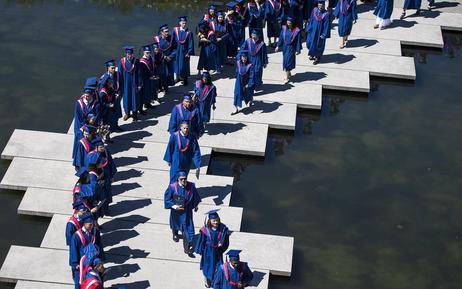Today's students enjoy more programs and degree opportunities at community colleges than ever before! However, with so many choices, finding the right community college can be overwhelming. While there are many factors to consider in choosing a community college, there are four specific checklist steps you can take to choose the perfect community college for your future.

Community Colleges Fight for the Right to Grant Four-Year Degrees

Students no longer need to attend a four-year university to obtain a bachelor's degree. More community colleges nationwide have "graduated" from issuing associate's to bachelor's degrees. Community college courses cost a mere fraction of public or private university options - which means that students who earn bachelor's degrees at their community college can save tens of thousands of dollars while pursuing their educational goals.
Unfortunately, not everyone in academia supports community colleges issuing bachelor's degrees. Critics are concerned that universities will experience a drop in student enrollment, which will ultimately lead to a loss of revenues. The debate is becoming increasingly heated, with educational leaders and community members divided on allowing community colleges to issue bachelor's degrees.
The Growing Fight for Four-Year Degrees
Community colleges in a dozen states nationwide have already gained the right to issue bachelor's degrees, and more campuses are looking for the same privileges.
For example, as News Day reveals, Michigan is fighting loudly against state restrictions that prevent community colleges from offering 4-year degrees. As Michigan's state representative John Walsh asserts, community colleges could offer improved job training opportunities for the future of Michigan's auto workers if local campuses could issue 4-year degrees. Subsequently, Walsh introduced a new bill that would permit community colleges to offer 4-year degrees in nursing, cement technology, and culinary arts. If the bill is approved, the large number of unemployed workers in the state could have opportunities to
Healthcare Careers: Nursing

If you enjoy learning about the human body and caring for others, then a career in nursing may be an excellent choice for you. In addition to the emotional rewards, nursing is a recession-proof career that can provide you with both employment stability and peace of mind. As the need for nurses continues to rise, graduates with nursing degrees or certifications will find themselves to be in high demand.
The Recession-Proof Perks of Nursing
Individuals who are considering a career in nursing should be thrilled to learn of the tremendous healthcare industry demand for nurses. As the average lifespan of Americans continues to rise, areas across the country are predicting a steady increase in the demand for nurses to meet their local population's needs.
For example, as the Washington Post reveals, healthcare industry leaders are seeking to increase the enrollment rates in the field of nursing, as many individuals are "Concerned that the average age of nurses is rising at the same time aging baby boomers are expected to increase the demand for medical care." Essentially, as nurses continue to age and retire, along with the general population, the field of nursing will continually demand more and more employees!
Elaborating on these concerns, the Secretary of the Maryland Department of Health, John M. Colmers, reminds individuals that the current healthcare employee is constantly and inevitably moving closer to retirement. For example,
How to Earn Extra Discounts As a Community College Student

Every college student is familiar with the challenges of managing finances amidst the pressures of tuition and book costs. Burdened with tests and assignments, many community college students have little time to earn supplementary income while enrolled in courses as a full-time students.
Fortunately, that seemingly simple college ID in one's wallet can help students save hundreds of dollars each year! With nearly endless discounts explicitly offered for college students, showing your community college ID can help immediately increase the amount of cash in your wallet.
Technology on the Cheap
If you're in the market for a new laptop, cell phone, or other form of technology, it will benefit you financially to shop with companies that cater to students' needs. Many companies that offer technological products strive to attract buyers by offering college discounts.
For example, Apple Computers offers college students, instructors, administrators, and staff members "Apple Education Pricing" on select products. Simply by being a community college student, you may be able to save hundreds of dollars on your next computer. In addition, Apple offers occasional promotions specifically for students. For example, when an eligible student purchases a computer, they may be able to receive another free Apple product.
Other technology-based companies that offer various student discounts include Dell Computers.
This video describes Apple's Back To School program.
Almost Free Entertainment
Before paying for the rising cost of a movie ticket,
Will the Failing Auto Industry Drive Up Community College Enrollment Rates?

While the United States has more than six million students enrolled at 1,000 community college campuses nationwide, only half a million students graduate from these institutions each year. According to President Obama, this low graduation rate must change in order for our country to prepare for a stronger and more fertile economy.
In specifically examining the troubling economic setbacks experienced by residents of Michigan, Obama asserts that many unemployed auto workers must actively pursue community college programs to gain new education and training for the future job openings that will arise. In light of PresidentObama's direct visit with Michigan's current and former auto workers, many residents are wondering if the failure of their auto industry will ultimately help drive up their community college enrollment rates.
The impact of Michigan's auto industry on community colleges.
As Yahoo News reports, President Obama's mid-July visit to Detroit was intended to help the city and surrounding areas face their current economic challenges with new vigor. Considering that Ford, GM, and Chrysler are all based out of Michigan, their recent financial struggles have contributed to a waterfall of job losses and salary cuts statewide.
During his visit, President Obama sympathized with residents while simultaneously attempted to boost morale with his $12 billion dollar proposal. With this proposal, President Obama hopes to increase the enrollment rates at community colleges, both in Michigan and across the country, to eventually create a more qualified workforce.
In looking forward to the economic perks
Recent Articles
















